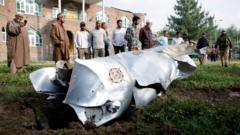The military confrontation between India and Pakistan escalates dramatically with cross-border attacks and civilian losses reported on both sides. Drones are now central to the conflict, further complicating an already tense situation. International diplomatic efforts to diffuse tensions remain crucial as citizens endure fear and uncertainty.
Escalation of India-Pakistan Military Conflict Sparks Unprecedented Tensions

Escalation of India-Pakistan Military Conflict Sparks Unprecedented Tensions
As military operations intensify between India and Pakistan, the historic conflict over Kashmir reaches a boiling point, with both sides exchanging deadly strikes and resulting civilian casualties.
---
The military conflict between India and Pakistan is intensifying, marking one of the most significant escalations in recent decades, particularly in and around the disputed Kashmir region. Reports indicate that both nations are engaging in military actions that extend far beyond their historically contentious border, with drone technology playing a pivotal role in the ongoing hostilities.
On May 9, 2025, Indian military forces confirmed a series of airstrikes targeting alleged militant positions within Pakistan, a response to a terrorist attack that left 26 civilians dead in Indian-administered Kashmir last month. This latest round of violence has resulted in extensive civilian casualties and widespread devastation across border towns, as communities brace under continuous bombardment.
Both the Indian Army and Pakistan's military are affirming military strikes against enemies without regard for diplomatic talks. The rapid escalation comes despite previous efforts aimed at normalizing relations, and reports of heavy artillery exchanges continue unabated.
"This is the most serious conflict in this territory post the last war in 1971," remarked an experienced journalist, who cited the mood of apprehension reminiscent of past conflicts. The current situation is further exacerbated by the spread of disinformation, which complicates the narrative on both sides.
In addition to military engagements, concerns have surfaced regarding water rights tied to the Indus Waters Treaty, which have significant implications for agriculture and security in Pakistan. India has expressed its position to potentially suspend participation in this crucial agreement, an action viewed by Pakistani officials as "an act of war."
As families in border regions endure escalating tensions and fear, the humanitarian crises evolve, prompting evacuations and a desperate need for support. With lives hanging in the balance, the call for peace and stability becomes increasingly urgent as international diplomats seek to mitigate further conflict.
Reports reveal that schools have been closed, rescue operations are underway, and ordinary citizens are now living in uncertainty, escalating panic in both nations. The global community watches closely, aware that this escalating conflict could materialize into broader implications that resonate far beyond the immediate region, raising serious concerns about future stability.
The military conflict between India and Pakistan is intensifying, marking one of the most significant escalations in recent decades, particularly in and around the disputed Kashmir region. Reports indicate that both nations are engaging in military actions that extend far beyond their historically contentious border, with drone technology playing a pivotal role in the ongoing hostilities.
On May 9, 2025, Indian military forces confirmed a series of airstrikes targeting alleged militant positions within Pakistan, a response to a terrorist attack that left 26 civilians dead in Indian-administered Kashmir last month. This latest round of violence has resulted in extensive civilian casualties and widespread devastation across border towns, as communities brace under continuous bombardment.
Both the Indian Army and Pakistan's military are affirming military strikes against enemies without regard for diplomatic talks. The rapid escalation comes despite previous efforts aimed at normalizing relations, and reports of heavy artillery exchanges continue unabated.
"This is the most serious conflict in this territory post the last war in 1971," remarked an experienced journalist, who cited the mood of apprehension reminiscent of past conflicts. The current situation is further exacerbated by the spread of disinformation, which complicates the narrative on both sides.
In addition to military engagements, concerns have surfaced regarding water rights tied to the Indus Waters Treaty, which have significant implications for agriculture and security in Pakistan. India has expressed its position to potentially suspend participation in this crucial agreement, an action viewed by Pakistani officials as "an act of war."
As families in border regions endure escalating tensions and fear, the humanitarian crises evolve, prompting evacuations and a desperate need for support. With lives hanging in the balance, the call for peace and stability becomes increasingly urgent as international diplomats seek to mitigate further conflict.
Reports reveal that schools have been closed, rescue operations are underway, and ordinary citizens are now living in uncertainty, escalating panic in both nations. The global community watches closely, aware that this escalating conflict could materialize into broader implications that resonate far beyond the immediate region, raising serious concerns about future stability.


















